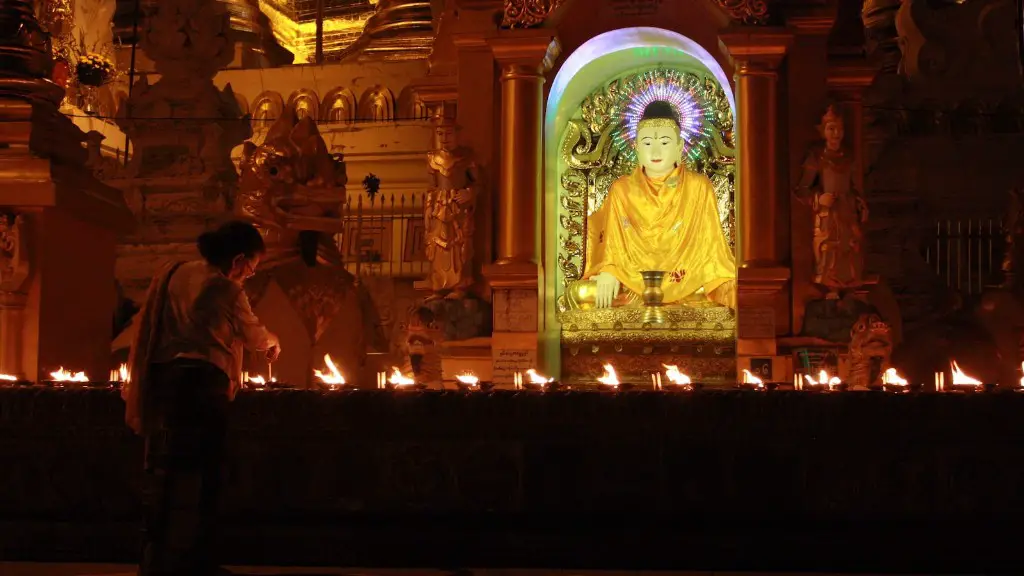Hinduism and Buddhism
Hinduism and Buddhism are two of the oldest, deepest and most complex spiritual traditions known to humankind. Both of them originate from ancient India, and share many common beliefs and values. One of the most talked-about shared beliefs between Hinduism and Buddhism is the concept of reincarnation. In this article, we’ll be examining the concept of reincarnation, and discussing how Hindus and Buddhists interpret the idea differently.
Reincarnation, also commonly known as rebirth or transmigration, is the belief that after one dies, their soul, or some other form of consciousness, is reincarnated into a new body. Depending on one’s karma from their previous life, they can be reincarnated into any form of living being, and the process happens in a cyclical manner. This is an ancient belief and is still held in many cultures around the world. In Hinduism and Buddhism, reincarnation is an intrinsic part of the spiritual belief system, and each tradition interprets it in its own unique way.
In Hinduism, the concept of reincarnation is intimately bound up with the notion of karma. As outlined in the Bhagavad Gita, the great Hindu scripture, for every action that a person does, there will be a corresponding reaction. The accumulated karma of the individual’s actions in this life and all past lives, determines the type of body they will inhabit in their next life. In this way, Hinduism suggests that we all have the ability to create our own destiny, and to be reborn in a higher or lower form depending on how we conduct ourselves in this lifetime.
In Buddhism, the idea of reincarnation is somewhat different. Buddhism rejects the Hindu notion of karma, instead asserting that all of our actions in this life and all prior lives are interrelated and part of the same cyclical process. According to Buddhism, reincarnation is simply part of a cycle known as samsara, in which the individual cycles through different forms, gradually working towards spiritual enlightenment. Ultimately, the idea is that enlightenment can only be achieved by working through this cycle in an ethical, meaningful way.
Both Hinduism and Buddhism embrace the idea of reincarnation, but with different interpretations and implications. While Hinduism sees reincarnation as related to karma, Buddhism views it as an integral part of its cyclical view of the universe. Both traditions teach us to be mindful of our words and actions, understanding that we have the power to shape our destiny with each thought and choice we make. By understanding this, individuals can take responsibility for their actions and strive for spiritual growth and enlightenment in each lifetime.
The Relationship Between Reincarnation and Cosmology
The concept of reincarnation is deeply linked to Hindu and Buddhist cosmology. In Hinduism, this cosmology is based on the three ‘Gunas’, which are qualities that define the fundamental nature of the universe. These qualities, which are associated with the divine powers of Brahman, are tamas (inertia), sattva (balance) and rajas (action). The individual’s reincarnation is determined by the predominance of these qualities in their soul, or Atman, and their ability to take positive action towards their spiritual growth. In Buddhism, the cosmological underpinnings of reincarnation can be found in itsdharma, or “the law of perfect harmony”. The dharma is made up of the Four Noble Truths which govern all of reality and phenomena, and serves as the basis for the cycles of death and rebirth that define the Buddhist understanding of reincarnation.
Reincarnation plays a significant role in the spiritual life of both Hindus and Buddhists. By understanding the relationship between reincarnation and cosmology, individuals can better understand the spiritual paths that they are on, and take positive steps towards their enlightenment. Ultimately, this understanding can help individuals to develop the wisdom and understanding to break the cycle of death and rebirth and reach the ultimate state of enlightenment.
The Role of Meditation
Meditation is an important tool for those who wish to gain greater understanding and insight into reincarnation in both Hinduism and Buddhism. In Hinduism, meditation is seen as a practice for gaining spiritual advancement, as it allows the individual to still the mind and gain greater insight into the workings of the universe. Similarly, meditation is seen as an important practice in Buddhism, which is said to help the individual gain greater insight into the cycles of rebirth and death, and to ultimately achieve enlightenment. Through meditation, individuals can gain a better understanding of the links between reincarnation and cosmology and make greater progress in their spiritual path.
Meditation has been practiced in both Hinduism and Buddhism for thousands of years and is seen as an essential part of spiritual growth and transformation. It can be seen as a way to enhance one’s understanding of the concept of reincarnation, and to learn how to lead an enlightened, ethical life. By taking the time to meditate, individuals can become more in tune with the cycles of rebirth and death and gain greater insight into the workings of the universe.
The Consequences of Reincarnation
The concept of reincarnation can have profound implications for an individual’s life and wellbeing. In Hinduism, it is believed that the actions we take in this life can have an impact on our lives in future incarnations, and individuals must strive to live a life of good deeds and ethical conduct. Similarly, in Buddhism, it is believed that our actions have an impact on the cycle of death and rebirth, and that by living in accordance with the dharma, and following the Four Noble Truths, we can move closer to achieving liberation and enlightenment. In both traditions, reincarnation is seen as an opportunity to strive for spiritual growth and progress.
However, there is also a darker side to the concept of reincarnation. In some cases, individuals can become so attached to their karma and past lives that they become stuck in an endless cycle of rebirth and death. In Hinduism and Buddhism, it is believed that individuals can become so attached to material objects, relationships and experiences that they forget the ultimate goal of enlightenment and remain stuck in the cycle of death and rebirth. This can have a profoundly negative impact on the individual’s mental and physical health and wellbeing.
Ultimately, it is important to recognize that the concept of reincarnation can both help and hinder us in our spiritual path. By understanding the relationship between reincarnation and cosmology, and engaging in practices such as meditation and mindfulness, individuals can both gain greater insight into the concept and make more informed choices in their lives so as to avoid becoming trapped in the cycle of death and rebirth.
The Impact of Karma on Reincarnation
Karma plays a significant role in the understanding of reincarnation in both Hinduism and Buddhism. In Hinduism, karma is seen as the accumulation of an individual’s actions, which will determine the form they will take in their next incarnation. In Buddhism, karma is seen as part of the cycle of death and rebirth, and is viewed as a cause and effect relationship. In both cases, it is believed that individuals are responsible for their own karma, and can take steps to improve their circumstances in each life.
The understanding of karma also has an important impact on how individuals approach their spiritual growth. In Hinduism and Buddhism, it is believed that individuals are responsible for their own karma, and can take steps to improve their circumstances in each life. Through awareness and mindfulness, individuals can work towards creating a life that is in accordance with their dharma, and strive for spiritual advancement. By understanding the role of karma, individuals can gain greater insight into reincarnation and make more informed choices in their lives.
Karma is also closely linked to the concept of cause and effect, and it is believed that an individual’s actions can have a ripple effect on the world. In Hinduism and Buddhism, it is said that we are all interconnected, and our actions in this life can have a positive or negative impact on the universe. Through understanding how our actions can lead to cause and effect in the universe, individuals can make more informed decisions regarding their spiritual path and work towards creating a life that is more in alignment with the dharma.
The Meaning of Reincarnation
Reincarnation is a powerful concept that can take on many different meanings for different individuals. For some, it is seen as an opportunity for spiritual growth, with each life being seen as a learning opportunity to help us progress towards enlightenment. For others, it is seen as a fascinating insight into the nature of the universe, and how our actions in this life can have an impact on our future lives. And for some, it is seen as a way to stay connected to those who have passed away, and to gain a deeper understanding of their life and their journey.
The concept of reincarnation is a fascinating one, and consequently, it has been a source of great spiritual debate and exploration over the centuries. While Hindus and Buddhists may take different approaches to the idea, it is clear that both believe in the idea of reincarnation. By understanding the concept of reincarnation, individuals can gain greater insight into the workings of the universe, and strive for ethical and spiritual growth in each life.

